The University of Ljubljana contributes to the debate on the future of micro-credentials at the European level

Tamara Boh
Date of publication:
On Tuesday, 27 May 2025, the Permanent Representation of the Republic of Slovenia to the EU in Brussels hosted an international panel discussion titled “Synchronising Micro-Credentials in the EU Ecosystem: Opportunities and Challenges for Learners, Employers, and Higher Education Institutions”. The event was organised by the University of Ljubljana and the Slovenian Business and Research Association (SBRA) in Brussels. The event brought together various stakeholders from higher education and business to discuss the role of micro-credentials in today's educational ecosystems.
Since the adoption of the EU Council Recommendation on a European approach to micro-credentials for lifelong learning and employability, Member States have been formulating national strategies to incorporate micro-credentials into their education and employment systems. As a flexible and targeted tool for enhancing skills and competencies, micro-credentials are emerging as a key response to the demands of the modern labour market and the growing importance of lifelong learning in an ever-evolving socio-economic landscape.
“Micro-credentials position universities as agile and high-quality responders to societal and economic needs, enabling the transfer of our cutting-edge knowledge to address urgent local and global challenges,” said Prof. Dr Ksenija Vidmar Horvat, Vice-Rector for Academic and Student Affairs at the University of Ljubljana.
Micro-credentials – Responding to the needs of a rapidly changing labour market
Establishing a trustworthy micro-credential system requires strong and coordinated support from all stakeholders – educational institutions, businesses, the public sector and civil society. A firm commitment to quality assurance is essential in building such a system. This seminar focused on quality assurance, the development of trust, and strategies for integrating micro-credentials into the systems of all stakeholders.
Simon Roy, Head of Higher Education Policy Directorate for Education and Skills at the OECD, highlighted that micro-credentials are becoming a significant component of education policy across many OECD member countries. Some nations, including Australia, Ireland and the Netherlands, are already implementing national pilot initiatives, while many European Union governments are actively working towards the creation of integrated national micro-credential systems.
Maria Kelo, Director of Institutional Development at the European University Association (EUA), emphasised that micro-credentials represent a valuable form of implementing education, enabling the certified acquisition of new knowledge and skills, as well as the enhancement of existing competencies. She also underscored the central role of quality assurance in this context: “To be trusted and recognised as a legitimate component of higher education, micro-credentials must be subject to the same rigorous quality standards as traditional university programmes.”
Aleksandar Šušnjar, Director of the European Quality Assurance Register (EQAR), addressed the challenges that the expansion of the educational format poses for external quality assurance. He noted that these challenges are closely linked to lifelong learning, which brings two key issues to the fore: the “unbundling” of educational offerings and the structuring of education into smaller learning units on the one hand, and the absence of a formal framework comparable to that of traditional diplomas on the other. “If an external quality assurance system can effectively meet these challenges, it will demonstrate its relevance regardless of the educational format by focusing on what truly matters – the quality of the learning experience and educational outcomes,” he explained.
Bieke Morlion, Team Leader for Alumni and Lifelong Learning at Ghent University, shared that their university is developing micro-credentials to support lifelong learning. The initiative emphasises integration with the labour market and wider society, as well as the sharing of best practices to engage all stakeholders.
Asst. Prof. Dr Jana Arbeiter and Prof. Dr Andrej Kos, Chair and Vice Chair of the Programme Committee for Micro-Credentials at the University of Ljubljana, highlighted that micro-credentials are becoming an important tool at the University for enhancing cooperation with the broader community and addressing the needs of society and the labour market. They particularly emphasised the quality assurance system, institutional governance mechanisms and examples of good practice that reflect strong collaboration with external stakeholders.
Marjana Majerič, MSc, Executive Director for Strategic Development and Internationalisation at the Chamber of Commerce and Industry of Slovenia, emphasised that micro-credentials can serve as a vital bridge between education and the labour market – provided they are developed from the ground up, with a clear focus on the needs of the economy. “This means we must co-create content – businesses, chambers and universities working together. The business sector is looking for solutions that are fast, flexible and directly applicable in practice. Micro-credentials have this potential if they are grounded in real business needs. At the Slovenian Chamber of Commerce and Industry, we therefore advocate for their strategic and purposeful integration into the human resources development system,” she explained.
Dr Darja Ferčej Temeljotov, Strategic Programmes Advisor at Lek farmacevtska družba d.d., underlined her belief that continuous education, skill enhancement, and the acquisition of new knowledge are essential to the success of individuals, teams, companies and society at large in an increasingly dynamic environment. She shared the example of a successful pilot training programme on sterility and contamination, developed in collaboration with the Biotechnical Faculty at the University of Ljubljana. “The result was not only new knowledge for the participants, but also valuable insights and lessons for both academia and industry,” she noted.
The need for a coordinated but flexible European approach
The seminar concluded with a roundtable discussion on synchronising the quality assurance of micro-credentials in higher education institutions. The conversation highlighted several key challenges, including building trust in internal and external quality assurance systems, aligning institutional autonomy with European standards, adapting quality mechanisms to the flexible nature of micro-credentials, and increasing the involvement of businesses in content development and evaluation.
In a constructive dialogue, the participants emphasised that the successful future of micro-credentials requires a coherent European approach to quality, one that must be grounded in institutional practices and strong partnerships with external stakeholders. This will allow the relevant, credible and effective design of short courses and training to obtain micro-credentials, and the evaluation of the knowledge, skills and competences acquired.
The University of Ljubljana is actively engaged in co-creating solutions that connect academic excellence with the evolving social and economic needs of the future. A firm commitment to quality assurance is central to this mission, as it underpins the broader recognition of micro-credentials and their meaningful integration into education and employment systems.
Detailed presentations are available on the website.
-
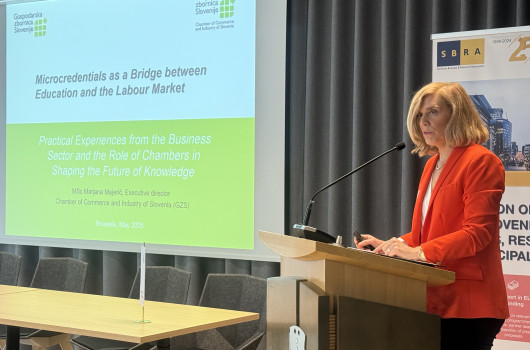
Mag. Marjana Majerič, izvršna direktorica za strateški razvoj in internacionalizacijo pri Gospodarski zbornici Slovenije (GZS)
Author: Tjaša Lenarčič
-
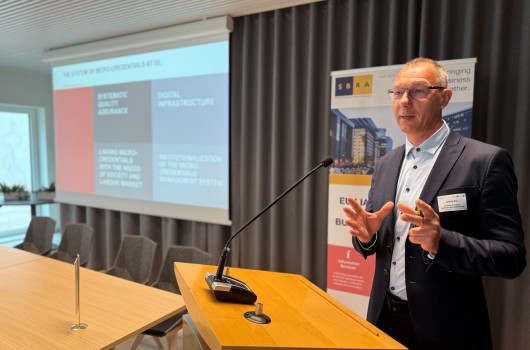
Prof. dr. Andrej Kos, podpredsednik Programskega sveta za mikrodokazila na Univerzi v Ljubljani
Author: Boštjan Šinkovec
-
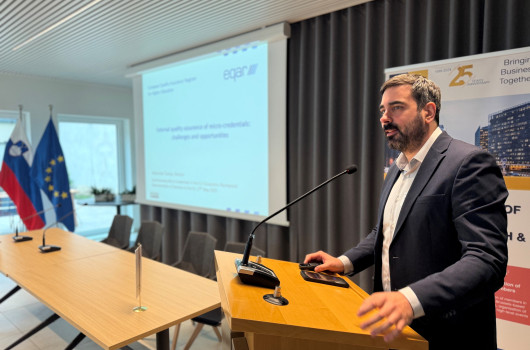
Aleksandar Šušnjar, direktor Evropskega registra za zagotavljanje kakovosti (EQAR)
Author: Boštjan Šinkovec
-
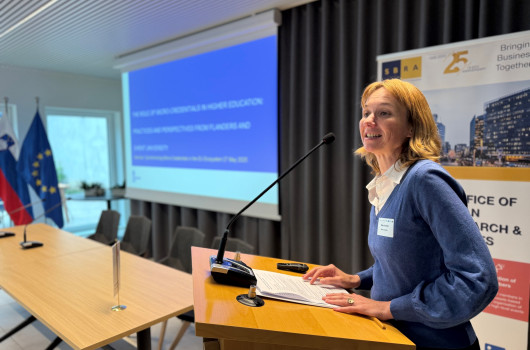
Bieke Morlion, vodja alumnov in vseživljenjskega učenja na Univerzi v Gentu
Author: Boštjan Šinkovec
-
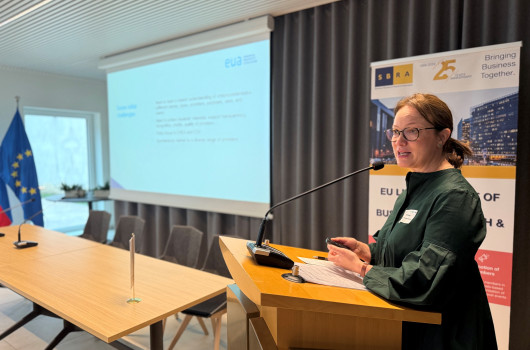
Maria Kelo, direktorica za institucionalni razvoj pri Evropski univerzitetni zvezi (EUA)
Author: Boštjan Šinkovec
-
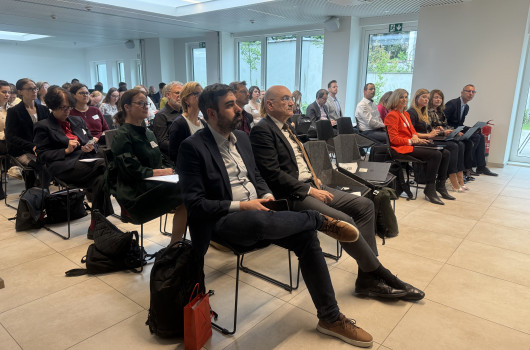
Seminarja se je udeležilo okoli 70 udeležencev
Author: Tjaša Lenarčič
-
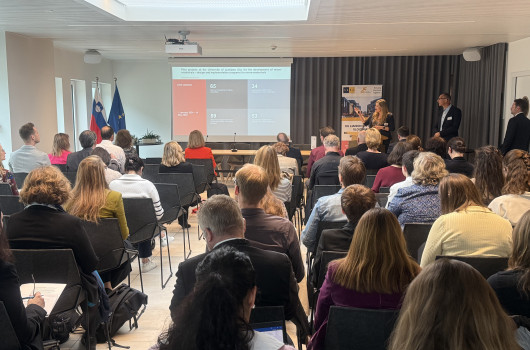
Doc. dr. Jana Arbeiter in prof. dr. Andrej Kos, predsednica in podpredsednik Programskega sveta za mikrodokazila na UL
Author: Tjaša Lenarčič
-
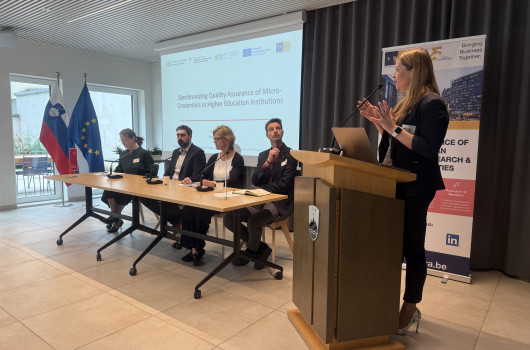
Okrogla miza "Usklajevanje zagotavljanja kakovosti mikrodokazil v visokošolskih ustanovah"
Author: Tjaša Lenarčič
The project is co-funded by the Republic of Slovenia, the Ministry of Higher Education, Science and Innovation, and the European Union – NextGenerationEU.





